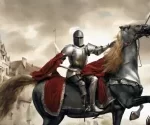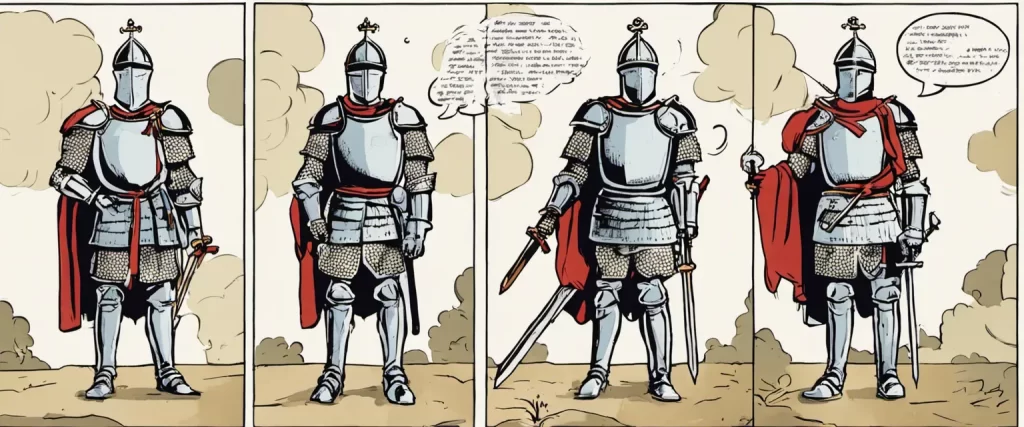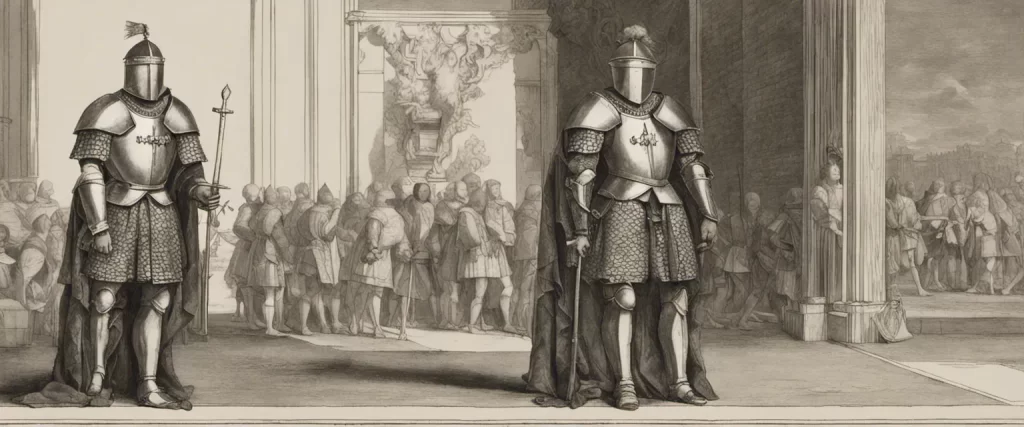
What is Chivalry Spirit
Chivalry Spirit refers to the code of conduct and values associated with the medieval concept of chivalry. It embodies qualities such as honor, loyalty, courage, and respect in dealings with others. The chivalry spirit encompasses the idealized image of a medieval knight, emphasizing virtues such as courtesy, gallantry, and generosity. It also emphasizes the duty to protect and defend the weak, as well as the pursuit of justice and fairness. This concept of chivalry spirit remains influential in modern society, often symbolizing nobility and integrity.
What Can We Get From Chivalry Spirit?
From a chivalry spirit, we can get numerous qualities, values, and virtues that can greatly impact our personal and social lives. Here are some things we can get from a chivalry spirit:
1. Honor and Integrity: Chivalry promotes a strong sense of honor and integrity, encouraging individuals to behave in an ethical and principled manner. It emphasizes the importance of upholding one’s word and being trustworthy.
2. Respect: Chivalry instills the value of respect towards others, regardless of their social status, gender, or background. It promotes treating others with dignity, kindness, and empathy.
3. Courage: Chivalry encourages individuals to be brave, face challenges, and overcome obstacles with courage. It inspires us to act heroically and stand up for what is right, even in the face of adversity.
4. Responsibility: The chivalry spirit emphasizes the importance of taking responsibility for one’s actions and decisions. It encourages individuals to be accountable and fulfill their duties and obligations towards others and society.
5. Selflessness and Service: Chivalry promotes selflessness and service to others. It encourages individuals to put the needs and well-being of others before their own, showing compassion and providing assistance when required.
6. Fairness and Justice: Chivalry upholds the principles of fairness and justice, advocating for equal treatment and opportunities for all. It opposes discrimination and injustice, and promotes a sense of equality and fairness in all interactions.
7. Politeness: Chivalry values being polite and courteous, promoting good manners and respectful behavior towards others. It encourages individuals to display kindness, courtesy, and consideration in their daily interactions.
8. Love and Loyalty: Chivalry emphasizes the importance of love, loyalty, and devotion in relationships. It inspires individuals to be loyal and committed to their loved ones, showing care, affection, and support.
9. Leadership: Chivalry nurtures leadership qualities, encouraging individuals to lead by example, inspire others, and make a positive impact on their communities. It emphasizes the importance of responsible and ethical leadership.
10. Gratitude: Chivalry teaches individuals to be grateful for the blessings in their lives and to express gratitude towards others. It fosters an attitude of appreciation, recognizing and valuing the contributions and kindness of others.
Overall, a chivalry spirit encompasses a range of virtues and values that can help create a more respectful, compassionate, and harmonious society.
Strategies in Learning Chivalry Spirit
1. Study the Code of Chivalry: Start by familiarizing yourself with the principles of the Code of Chivalry, which includes ideals like honor, loyalty, courage, and generosity. Learn about the historical context and why these values were important at that time.
2. Read Books and Research: Read books on medieval history and chivalry to understand the spirit of chivalry and the lives of knights. This will help you gain a deeper understanding of the concept.
3. Watch Movies and Documentaries: Watch movies and documentaries that depict chivalry, knights, and the medieval period. This visual representation can help you connect with the chivalry spirit and see how it was portrayed in different settings.
4. Emulate Chivalrous Behaviors: Actively practice chivalrous behaviors in your daily life. This could include showing respect and politeness to others, helping those in need, and demonstrating acts of kindness and generosity.
5. Engage in Martial Arts or Historical Reenactments: Participate in martial arts or historical reenactments that focus on knightly combat or chivalrous ideals. Immersing yourself in these activities can help you experience the physicality and mindset of chivalry.
6. Reflect on Personal Values: Reflect on your personal values and how they align with the principles of chivalry. Identify areas where you can improve and develop chivalrous qualities in your own life.
7. Seek Role Models: Look for individuals who embody the chivalrous spirit and learn from their examples. These could be historical figures, fictional characters, or even real people in your life who demonstrate qualities of chivalry.
8. Engage in Acts of Service: Offer your time and skills to help others in need. By actively engaging in acts of service, you can practice the selflessness and generosity associated with chivalry.
9. Promote Courtesy and Respect: Encourage courteous and respectful behavior in your social circles. By promoting these values, you can create an environment that fosters the chivalry spirit.
10. Continuously Learn and Grow: Chivalry is a lifelong journey of self-improvement and personal growth. Continuously seek opportunities to learn and grow in your understanding and practice of chivalry.

Don Quixote by Miguel De Cervantes Saavedra
Summary
Don Quixote, written by Miguel de Cervantes Saavedra, is a Spanish novel published in two parts, in 1605 and 1615. The story follows the delusional adventures of Alonso Quixano, a middle-aged man who becomes enamored with chivalry novels and loses his sanity, adopting the name Don Quixote to become a knight-errant.
Believing himself to be a knight on a noble quest, Don Quixote sets out on various misadventures accompanied by his loyal squire, Sancho Panza. Their exploits are often comical and absurd, as Don Quixote interprets everyday occurrences as heroic battles against imaginary giants and enemies.
Throughout the novel, Cervantes juxtaposes the theme of chivalry and heroism with the harsh realities of the real world. Don Quixote’s idealism clashes with a society that has already moved on from the age of chivalry, leading to comedic misunderstandings and conflicts.
The novel is filled with memorable characters and episodes, including the famous encounters with windmills mistaken for giants, and the “Dulcinea del Toboso” obsession, where Quixote’s vision of a romantic damsel is based on the image of an ordinary peasant girl.
Cervantes uses satire and irony to explore themes such as the power of literature, the line between reality and fantasy, and the nature of identity and madness. Don Quixote is seen as a critique of idealism and the dangers of excessive imagination.
Considered one of the greatest works of literature, Don Quixote has had a profound influence on subsequent novels and has often been interpreted as a commentary on the human condition, the pursuit of dreams, and the clash between idealism and reality.
Reasons for Recommendation
1. Exemplifies the Chivalric Code: Don Quixote embodies the spirit of chivalry, as he passionately believes in knights, castles, and quests for honor and virtue. The book explores these ideals and critiques the fading influence of chivalry in a changing society.
2. Satirical Critique: Cervantes uses Don Quixote’s obsession with chivalry to satirize the romanticized ideals of the past. Through humorous and absurd situations, the author challenges the misplaced values that often accompany the chivalric spirit, making readers question the relevance and practicality of such ideals in a changing world.
3. Exploration of Idealism vs Reality: Don Quixote’s unwavering commitment to chivalry highlights the clash between idealism and reality. By following his dreams and living according to his own ideals, readers are encouraged to reflect on the power of one’s convictions and the impact they can have on their lives and those around them.
4. Development of Character: Don Quixote’s character arc reflects the impact of the chivalric spirit on his personality and perception of the world. Through his adventures, the readers witness his transformation from a deluded dreamer to a more grounded individual, thereby exploring the complexities and consequences of holding fast to the chivalric ideal.
5. Timeless Themes: Despite being written in the 17th century, the themes explored in Don Quixote remain relevant. The idea of pursuing noble causes, the struggle between reason and imagination, and the search for personal identity are all enduring themes that resonate with readers from different eras.
6. Rich Literary Tradition: Don Quixote is recognized as a foundational work in Western literature. Its influence can be seen in countless subsequent novels, films, and artistic works. By reading this seminal masterpiece, readers gain a deeper understanding of the literary heritage and the origins of many tropes and archetypes associated with chivalry.
7. Social Commentary: The chivalric spirit portrayed in Don Quixote is also used as a lens to critique various aspects of society, including the corrupting influence of power, the role of women, and the societal norms that constrain individuals. This social commentary adds layers of meaning to the book, making it a thought-provoking read.
8. Engaging and Entertaining Narrative: Don Quixote is known for its engaging storytelling and witty dialogues. The adventures of the deluded knight and his loyal squire Sancho Panza captivate readers, providing both entertainment and intellectual stimulation.

The Road Less Traveled by M. Scott Peck
Summary
The Road Less Traveled, written by M. Scott Peck, is a self-help book that explores the journey of personal growth and spiritual development. The book presents various concepts and insights on discipline, love, and grace, emphasizing the importance of embracing pain and difficulties in order to achieve personal fulfillment and mental well-being.
Peck divides the book into four main sections. In the first part, he discusses the importance of discipline and the willingness to confront and solve problems. He highlights the significance of delaying gratification and taking responsibility for one’s actions as fundamental aspects of personal growth.
In the second section, Peck delves into the nature of love and its different forms. He challenges conventional notions of love, stating that true love often involves sacrifices, compassion, and selflessness. He also emphasizes the necessity of self-love and self-acceptance to foster healthy relationships.
The third section explores the idea of spiritual growth and the importance of embracing a belief system beyond the material world. Peck discusses the need for individuals to discover their own path and meaning in life, suggesting that this journey often involves confronting pain and suffering to find fulfillment and transcendence.
In the final section, Peck introduces the concept of grace, which he defines as a force of spiritual strength that guides individuals towards personal growth. He discusses the value of humility, acceptance, and forgiveness in cultivating grace.
“The Road Less Traveled” emphasizes the significance of personal responsibility, honesty, and the willingness to face difficulties as essential components of a fulfilling life journey. It encourages readers to cultivate discipline, love, spirituality, and grace to navigate the challenges of life and find personal fulfillment.
Reasons for Recommendation
1. The book promotes personal growth and self-improvement, which are fundamental aspects of chivalry. It encourages readers to embark on a journey of self-discovery, facing their fears and insecurities, and ultimately becoming better versions of themselves.
2. Chivalry emphasizes the importance of kindness, compassion, and respect, not only towards others but also towards oneself. “The Road Less Traveled” advocates for self-care, self-love, and prioritizing mental and emotional well-being, aligning with the chivalrous values of selflessness and honor.
3. In line with the chivalrous spirit, the book emphasizes the significance of developing healthy relationships. It delves into the complexities of human interaction, highlighting the importance of open communication, honesty, and integrity in building strong and meaningful connections with others.
4. The book addresses the theme of discipline and perseverance, essential elements in the chivalrous spirit. It encourages readers to confront life’s challenges head-on, demonstrating resilience and courage in the face of adversity.
5. Chivalry often revolves around the concept of serving a higher purpose or calling. The Road Less Traveled” explores the concept of spirituality and the search for meaning in life, inviting readers to reflect on their purpose and values, and to live a life aligned with their deepest convictions.
6. The book delves into the importance of personal responsibility and accountability, traits that are highly valued in a chivalrous individual. It encourages readers to take ownership of their choices, actions, and the consequences that follow, fostering a sense of honor and integrity.
7. “The Road Less Traveled” promotes humility and the recognition of our inherent imperfections. Chivalry acknowledges that no one is perfect, and this book provides insights into accepting and working on our flaws and vulnerabilities, with a focus on personal growth and character development.
Overall, “The Road Less Traveled” by M. Scott Peck aligns well with the chivalrous spirit by emphasizing personal growth, developing healthy relationships, perseverance, spirituality, personal responsibility, and humility. It offers valuable guidance and insights to individuals seeking to embody the principles of chivalry in their lives.
A Distant Mirror by Barbara W. Tuchman
Summary
A Distant Mirror: The Calamitous 14th Century by Barbara W. Tuchman is a historical non-fiction book that examines the society and events of Europe during the 14th century, particularly focusing on the life of French nobleman Enguerrand VII de Coucy. Tuchman uses Coucy’s life as a lens to explore the political, social, economic, and religious turmoil of the time.
The book portrays a range of issues faced by Europe during this period, including the devastating effects of the Black Death, which resulted in widespread death and economic upheaval. Tuchman explores the political struggles between rival factions, such as the Kingdom of England and the Kingdom of France, as well as internal conflicts within cities and kingdoms.
Coucy’s life story is interwoven with the narrative, providing a personal perspective of the events and reflecting the larger themes of the era. Through his experiences, Tuchman highlights the contrast between the lavish lifestyles of the nobility and the suffering of the common people, who faced poverty, disease, and war.
The book also delves into the religious climate of the 14th century, including the rise of the Church and its influence, as well as the various crusades and religious conflicts that shaped the era. Tuchman explores the corruption and abuses within the Church and the impact of religious devotion on society.
Overall, “A Distant Mirror” offers a comprehensive and vivid portrayal of the 14th century European society, shedding light on its complexities, inequalities, and the challenges faced by individuals like Enguerrand VII de Coucy.
Reasons for Recommendation
1. Captures the essence of chivalry: A Distant Mirror chronicles the tumultuous period of the 14th century, which is often referred to as the “Age of Chivalry.” The book beautifully captures the spirit of chivalry by delving into the lives of knights, nobles, and the code of ethics they adhered to. It allows readers to immerse themselves in a time when honor, loyalty, and courage were highly valued.
2. Provides a nuanced understanding: Barbara W. Tuchman’s exhaustive research and meticulous attention to detail enable readers to gain a comprehensive understanding of the chivalric ideals. Through vivid descriptions and engaging storytelling, Tuchman paints a complex picture that showcases both the romanticized aspects of chivalry, as well as the harsh realities knights faced in an era characterized by warfare, plague, and social upheaval.
3. Offers a multifaceted exploration: A Distant Mirror goes beyond a superficial analysis of chivalry by understanding its impact on various aspects of medieval society. It delves into the relationships between knights, their lords, and the effects chivalric culture had on gender roles, religious practices, and the feudal system. This multifaceted exploration allows readers to grasp the broader implications of chivalry as a cultural, societal, and historical phenomenon.
4. Engrossing narrative: Tuchman’s writing style effortlessly weaves together historical facts, personal accounts, and engaging anecdotes. This carefully crafted narrative aids in painting a vivid picture of the chivalric era, making the book highly readable and enjoyable for both history enthusiasts and general readers. The compelling storytelling allows readers to connect with the characters and their struggles, ultimately fostering a deeper appreciation for the spirit of chivalry.
5. Timeless relevance: Despite being set in the medieval period, A Distant Mirror presents a narrative that resonates with contemporary readers. The book tackles themes such as the pursuit of honor, the relationship between power and morality, and the consequences of societal upheaval. By examining chivalry within the historical context, readers can draw parallels to modern-day concepts of honor, integrity, and the role of ethics in society.
Overall, A Distant Mirror offers an in-depth exploration of chivalry’s spirit, presenting readers with a captivating, nuanced, and thought-provoking account of the medieval era. It is an excellent choice for those seeking to understand the essence of chivalry and its lasting impact on society.